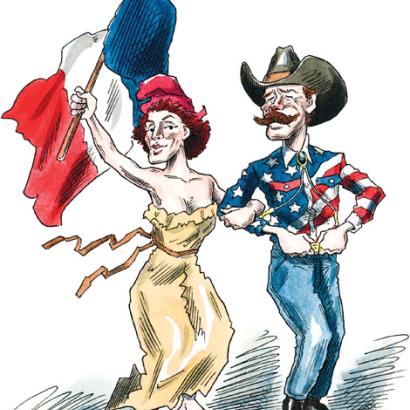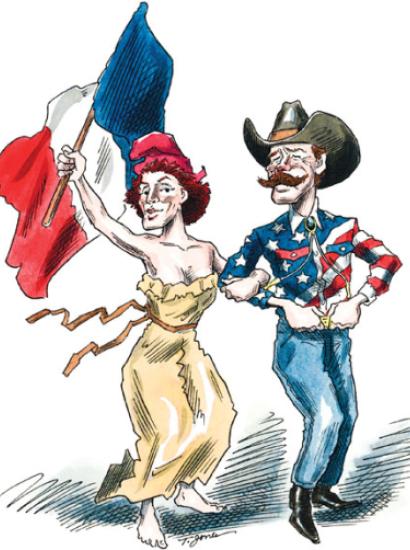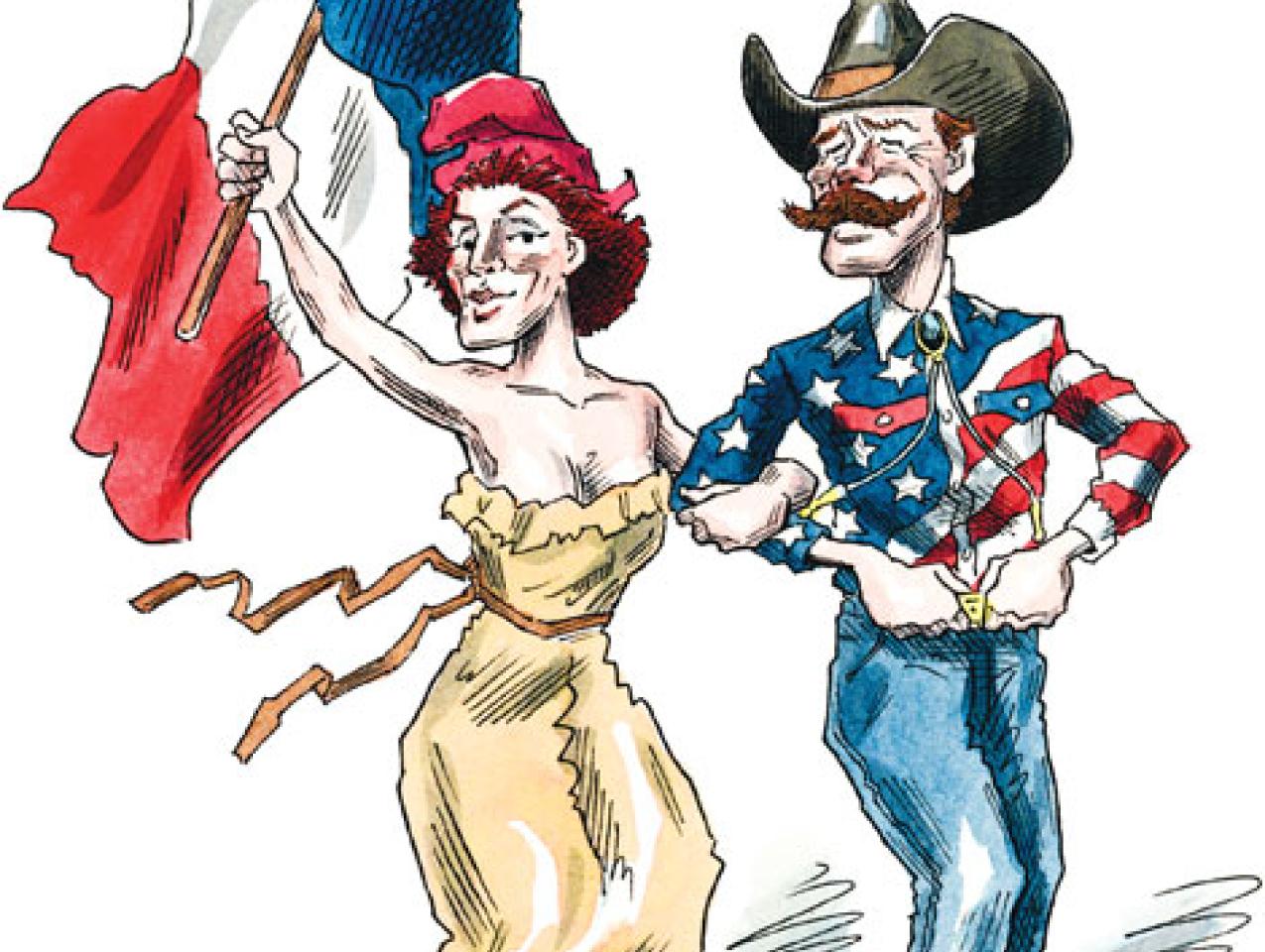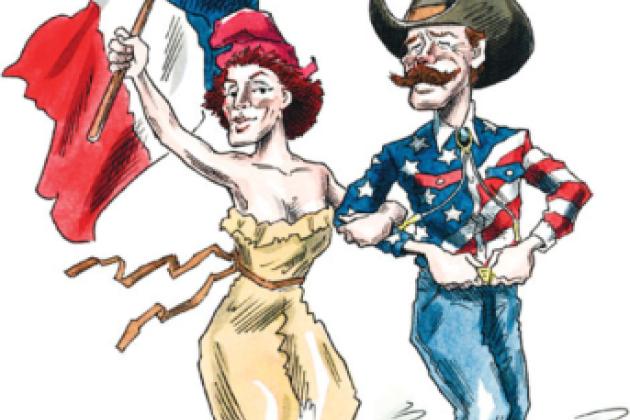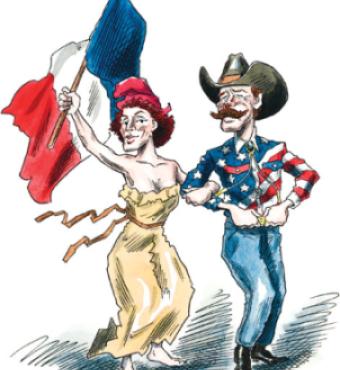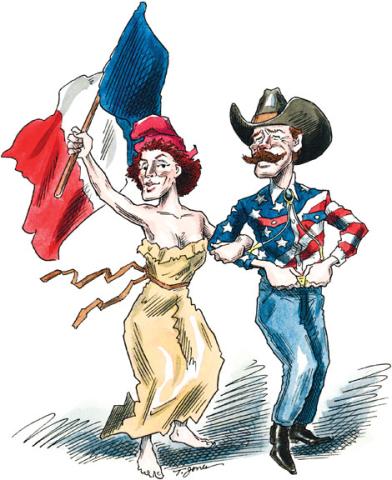- Economics
- International Affairs
- US Foreign Policy
- US
- Contemporary
- World
- Security & Defense
- US Defense
- Terrorism
- History
In June 2004, President Bush tried to leverage the U.S. chairmanship of the G-8 summit to launch the centerpiece of the administration’s “forward strategy of freedom” for the post-9/11, post-Saddam Middle East. The project would marshal U.S. and European diplomatic and financial resources to press for greater social, political, and economic freedom from Marrakesh to Bangladesh. Well before G-8 leaders convened in Sea Island, Georgia, however, the Europeans had leaked a draft of Bush’s proposal to the Arabic newspaper Al-Hayat and demanded far-reaching revisions as a condition for their support. Eventually, the G-8 did inaugurate what it dubbed the Broader Middle East and North Africa (BMENA) initiative, but it was greatly diluted from what the White House wanted. BMENA then promptly sank into low-profile obscurity.
On both sides of the Atlantic, the Sea Island debacle seemed to confirm what Robert Kagan had observed exactly two years earlier—that “on major strategic and international questions today, Americans are from Mars and Europeans are from Venus: they agree on little and understand one another less and less.” Indeed, in the years after Operation Iraqi Freedom commenced, the issue of democracy promotion in the Middle East and beyond has, in the minds of many, become the focus of a new transatlantic divide. The perception that Americans alone understand the value of global democracy and are prepared to shoulder the heavy burden involved in its promotion—while Europe urges caution and seeks stability over change— has infected elite discourses and distorted policy deliberations. “Never,” according to liberal commentator Michael Ignatieff, “has America been more alone in spreading democracy’s promise.”
That conclusion would be enormously depressing if it were true. But it is not. In reality, Americans and Europeans now share the axiomatic understanding that, as the 2006 National Security Strategy of the United States (NSS) put it: “In the world today, the fundamental character of regimes matters as much as the distribution of power among them. The goal of our statecraft is to help create a world of democratic, well-governed states that can meet the needs of their citizens and conduct themselves responsibly in the international system.” Almost three years before the White House issued that NSS, in fact, the first European Security Strategy (ESS)—formulated by Javier Solana and adopted unanimously by the heads of state of the European Union—articulated an essentially identical vision for a democratic world order and the policy recipe for getting there. “The quality of international society depends on the quality of the governments that are its foundations,” the ESS declared. “The best protection for our society is a world of well-governed democratic states. Spreading good governance, supporting social and political reform, dealing with corruption and abuse of power, establishing the rule of law, and protecting human rights are the best means of strengthening the international order.”
THE WORLD AGREES
At the national level too, the governments of the United Kingdom, Germany, Spain, the Netherlands, Denmark, Norway, and Sweden have all— since the end of the Cold War but particularly after 9/11—gradually elevated the promotion of good governance and democracy abroad on their lists of foreign policy priorities. Under the premierships of both Tony Blair and his successor, Gordon Brown, Britain has, in particular, provided some of the most elegant deductive arguments for why the West must actively encourage the promotion of political freedom around the globe, as a matter of moral principle as well as enlightened self-interest.
In March 2005, then–foreign secretary Jack Straw told a Labour Party convention that the West’s share of responsibility for the dearth of democracy in the Arab world “is not down to too much enthusiasm for promoting democracy, but too little,” and called on Western leaders to “set democracy as our compass.” Straw’s successor, David Miliband, reiterated in February 2008 what he called “the democratic imperative,” arguing forcefully that transatlantic divisions over the war in Iraq must not “obscure our national interest, never mind our moral impulse, in supporting movements for democracy.”
Nor is it all empty rhetoric. Measuring spending on democracy assistance programs is notoriously difficult, but there is little doubt that—even when we discount American expenditure on postconflict state building in Afghanistan and Iraq—democracy assistance spending has grown substantially over the past decade, on both sides of the Atlantic. U.S. government funds allocated specifically to democracy promotion abroad rose from an average of $125 million a year in the 1990s to nearly $1 billion per annum under the Bush administration. In addition, the Millennium Challenge Corporation (MCC), created by the United States in 2004, now maintains assistance compacts with sixteen countries—including Armenia, Georgia, Ghana, Madagascar, Mongolia, Morocco, Mozambique, and Tanzania— totaling $5.6 billion. For a country to become eligible for MCC funding, it must demonstrate achievements in fighting corruption, strengthening civil liberties and the rule of law, and encouraging economic freedom.
A parallel trend has emerged in Europe. Beginning with practically no involvement in the 1980s, the countries of the European Union now dedicate $1.3 billion per year directly to programs promoting good governance and democracy around the globe. In 2004, for example, Germany allocated nearly 10 percent of its total official development aid (ODA), $360 million, to democracy promotion. The figures for Britain and Spain were $346 million (11 percent of ODA) and $103 million (9 percent of ODA), respectively. Among the large European nations, in fact, France alone has lagged, spending $62 million (1 percent of its annual development assistance) on promoting democracy abroad in 2004.
Like the American MCC, furthermore, the European Neighborhood and Partnership Instrument (ENPI), created by the European Union in 2006, seeks to tie substantial financial incentives to demonstrated commitments on the part of recipient countries to specified political, regulatory, and economic reforms. For the period 2007–13 (the current six-year budgetary cycle of the European Union), approximately 12 billion euros in EU funding have been earmarked to support reforms in ENPI-recipient countries that include Armenia, Egypt, Georgia, Lebanon, Moldova, Morocco, and Ukraine. In addition, a new EU Governance Facility will dispense 50 million euros per annum to those ENPI countries judged to have made the most progress in good governance. The first Governance Facility allocations were awarded in 2007 to Morocco and Ukraine.
More surprising, perhaps, European public opinion generally matches and on some counts exceeds levels of popular support for democracy promotion in the United States.
According to the Transatlantic Trends poll conducted by the German Marshall Fund (GMF) in 2006, for example, 71 percent of Europeans believe that it should be the role of the European Union to help establish democracy in other countries. In contrast, only 45 percent of Americans surveyed by the same poll were of the opinion that it should be the role of the United States to do so. (A poll conducted by the Chicago Council on Global Affairs in September 2008, on the other hand, found that 76 percent of American respondents consider democracy assistance to other nations to be a “very important” or “somewhat important” foreign policy goal for the United States.)
Both the Americans and Europeans surveyed by the GMF, furthermore, displayed similar levels of tolerance for varying types of action to encourage democratization abroad. On average, 78 percent of Europeans and 69 percent of Americans supported noncoercive forms of activity—for example, monitoring elections and supporting human rights and religious groups. In contrast, 34 percent of Americans and 24 percent of Europeans supported the use of military force to promote democracy.
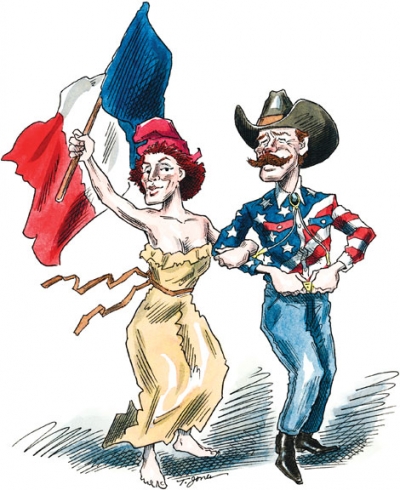
DIFFERENT ROADS TO THE SAME DESTINATION
Certainly, significant variations exist in how Americans and Europeans think about democracy promotion and pursue it in practice. Yet these disparities have far more to do with differences in the two continents’ historical experiences and military capabilities than with some deep transatlantic values gap.
Since the birth of the United States, many U.S. leaders have believed passionately that their democratic system of government not only has been responsible for the country’s liberty and prosperity but also has made the United States a moral force in the world—a “shining city upon the hill.” Different administrations have accorded different priority to democracy promotion and have provided different justifications for U.S. involvement, oscillating between “realism” that stresses the benefits of a liberal international order for U.S. national interests and “idealism” that trumpets the morality of democracy and the universality of its promise. Still, no American president, Republican or Democrat, has ever denied the importance of the goal or abandoned its pursuit. Indeed, President Bush’s embrace of democracy promotion, far from amounting to a radical departure from U.S. foreign policy traditions, affirms one of its oldest and most enduring.
In comparison, Europeans are relative newcomers to democracy promotion. Two generations ago, radical ideologies inimical to liberal democracy (Nazism, fascism, and communism) dominated the continent. One generation ago, Europe itself was divided between democratic and authoritarian regimes. The mammoth task of postwar reconstruction within Europe itself, the psychological and financial scars of European colonialism, and the restrictions imposed on European governments by Cold War bipolarity meant that, for Europeans, democracy promotion in the wider world could emerge as a viable foreign policy objective only after the final collapse of the Soviet bloc at the turn of the 1990s.
Moreover, the key formative experiences in democracy promotion have differed for Americans and Europeans. The postwar occupations of Germany and Japan mark the United States’ clearest and most profound success in establishing democratic regimes abroad. In contrast, European leaders view the expansion of European Union membership itself—first to southern Europe (Greece, Portugal, and Spain) and then to the postcommunist states of central and eastern Europe—as having been their most successful foreign policy strategy. The magnetic pull of the European Union, in fact, continues to be the linchpin of transatlantic efforts to anchor Turkey and the Balkan countries (including Bosnia-Herzegovina, Serbia, and Kosovo) in the democratic West.
But differences in outlook are easily overstated. Unlike the European Union, the United States is not accepting new members, yet Americans too have made robust use of international and regional organizations—NATO, the WTO, the Organization for Security and Cooperation in Europe (OSCE), the Organization of American States (OAS)—to embed countries in the liberal international order constructed under U.S. global leadership during the past six decades. Not only have Americans consistently supported EU expansion, but, as Daniel Drezner recently argued, the Bush administration has taken important steps to anchor emerging powers— notably Brazil, China, and India—in international forums in an attempt to make sure these rising giants buy into capitalist, pluralist institutions. Because these efforts lack the drama of war and have been deliberately quiet affairs, they have flown under the radar of most observers.
MARS AND VENUS COMPARE NOTES
Just as America is not and has never been all Mars, Europe is increasingly not all Venus. True, Europeans can and should do much more in Afghanistan and Iraq, but elsewhere it is they who are carrying a growing share of the burden of policing the world’s trouble spots. Since the collapse of Albania into chaos in 1997, in fact, either the European Union collectively or a European government has taken the lead in armed operations to restore order and establish representative government in Albania, Sierra Leone, Macedonia, Côte d’Ivoire, Bosnia-Herzegovina, and the Democratic Republic of the Congo.
Elsewhere, Americans and Europeans have displayed striking congruence in policies. Spearheaded by the United States and France, for example, in September 2004 U.N. Security Council Resolution 1559 ordered the removal of Syria’s military from Lebanon, the disarming of all Lebanese militias (including Hezbollah), and the holding of free and fair elections. After Syrian troops withdrew in May 2005, Britain, France, and the United States worked closely to dislodge Syria’s residual presence from Lebanon. Europeans and Americans are also, at times, united by failure: both Europe and the United States allowed Egypt’s Hosni Mubarak to renege on his February 2005 promise to allow opposition parties to run candidates against him in presidential elections later that year. Similarly, concerns over transnational drug trafficking and guerrilla rebel groups have trumped both EU and U.S. democracy-promotion objectives in Bolivia and Colombia.
Hyperbolic statements about U.S. “imperialism” and European “impotence” over the global struggle for democracy are misconceived, needlessly polarizing, and pernicious to the fundamental interests of the free world. Against a background of mounting challenges to the fortunes of freedom— from radical Islam and a resurgent, authoritarian Russia to the more diffuse dangers of high food prices and financial crises that threaten to unravel vulnerable democracies—the two central pillars of Western democratic power must alter the terms of their conversation about democracy promotion. Rather than paint each other’s caricatures, Americans and Europeans need to ask themselves and each other: How can we do this better?








